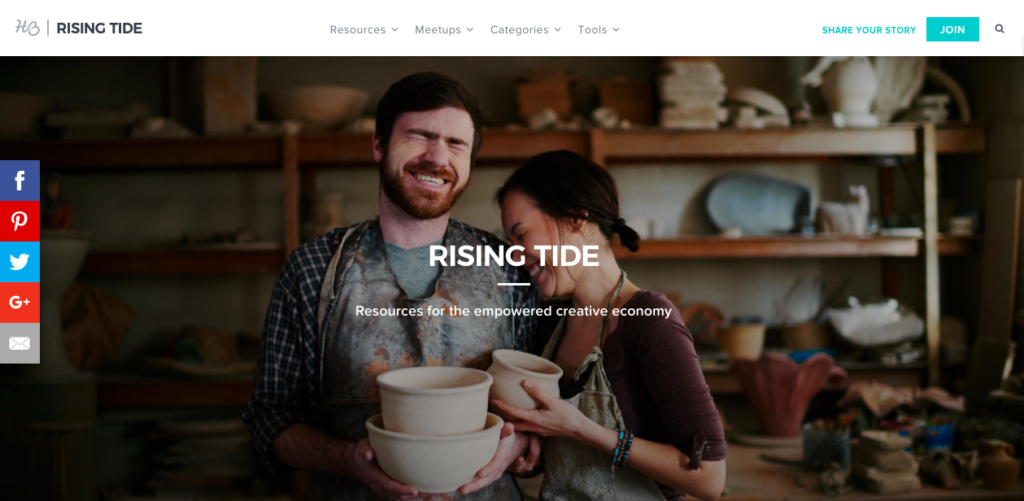Recently, we’ve been seeing and hearing a lot of confusion around the question of creating a blog for your business. It’s no surprise that blogging is top-of-mind — content marketing has been moving at the speed of light, particularly as more companies adopt the inbound marketing methodology. However, blogging isn’t the only way to distribute quality content. So how do you know whether you should create a blog for your business?
First of all, let’s clarify the difference between two terms that are often used interchangeably: blogging and content marketing. Content marketing is all about producing and providing helpful, relevant information to your prospective customers rather than pitching your product to them. Content marketing is a strategic approach to marketing; blogging is one of many marketing tools often used in a content marketing strategy.
“Content marketing is a strategic marketing approach focused on creating and distributing valuable, relevant, and consistent content to attract and retain a clearly defined audience — and, ultimately, to drive profitable customer action.” Content Marketing Institute
Blogging is a huge part of the content marketing world, but there are many other tools and platforms for reaching your customers. So what’s all the excitement around blogging? What makes it worth the investment?
The Benefits of Business Blogging
1. Blogging Helps SEO
Blogging can help your website show up in search results, especially if you write about keywords (short, searchable phrases) that your potential customers may type into a search engine. Blogging is great for SEO because each blog post creates a new page on your site. The more pages on your site, the better your chances of making it to page 1 of the search results. Additionally, each post provides new opportunities for other sites to link back to your website and for other social media accounts to share your posts on their feeds. In fact, companies that blog receive 97% more links to their website. Every link helps your website appear more trustworthy, which matters to search engines AND your potential customers.
2. Blogging Gives Leads More Reasons to Return to Your Site
If your blog posts are useful and informative, leads will have more reasons to revisit your site. If you’re a travel company, you could provide helpful city guides, packing lists and destination recommendations tailored to your buyer personas. San Francisco start-up Honeybook offers software for creative entrepreneurs and small businesses. Rather than using their blog to talk about how great their software is, they regularly publish resources and tools to help entrepreneurs with accounting, finance, social media strategy, marketing, branding, and other aspects of running a successful business. Their users and social media followers share and discuss these resources daily, which ultimately drives traffic back to Honeybook’s website and generates new leads.

3. It’s an Efficient Way to Promote and Recycle Content
If you have a small marketing team, you may be thinking, “How are we going to find the time to write all these blog posts?” You’re right — like any other marketing activity, blogging takes time. The good news is that once your team has created a piece of content, you can rework and recycle that content into social media posts, downloadable offers, and new, updated blog posts. You can take past research and turn it into an infographic, SlideShare or worksheet, as long as all of the information and data is up to date. This can make it easier for a small team to regularly produce great content without losing hours to the research process each time they write a blog.
4. A Blog Is a Great Way to Capture Leads
A 2016 Demand Gen Report found that 47% of buyers read 3-5 pieces of content before engaging with a sales rep. Your leads likely check out your content well before they get in touch with you, but that doesn’t mean you can’t learn more about them.
If you’ve written a valuable post and the reader wants to learn more, don’t let that interest go to waste! Forms and other calls-to-action are a few ways to learn more about your regular blog readers and see whether they would qualify as a lead. Pay attention to which posts receive the most views, shares and engagement, and use that to brainstorm about other relevant content you could provide. The better your blog content, the more likely it will contribute to a reader’s purchase decision.

5. Blog Posts Are Valuable and Shareable
Useful blog content is important — 94% of people who share posts do so because they think it might be helpful to others. Put yourself in your customer’s shoes. What problems can you help them solve? What kinds of content do they want to share on their social media pages to help their network, convey thought leadership or start conversations? If your content helps your customer help others, then it has increased value. Let this principle guide your writing and you’ll stay on track.
6. A Well-Written Blog Builds Thought Leadership and Credibility
Blogging is a great way to showcase the wealth of knowledge and experience of your team members. Demonstrating your expertise builds credibility, leading to stronger relationships with your customers, partners and network. Whenever possible, have members of your senior leadership team (including your CEO or executive director) write blog posts. This shows leadership, passion and expertise and conveys a unified, committed organization. Blogging also benefits executives because it requires removing oneself from the fray of day-to-day operations in order to think about big-picture topics and ideas.
How Do I Know If a Blog Is Right for My Business?
Now that we’ve covered a few of the reasons to start a blog, the question remains whether you shouldactually launch one. Although blogging has many benefits, it isn’t the only way to distribute your top-notch content to your prospective customers. Remember that blogging is part of content marketing, not the other way around. There are other types of content to consider, including:
- Video (used in social media marketing AND content marketing)
- Case studies
- Newsletters
- Long-form written content (e.g. whitepapers, eBooks and in-depth guides)
- Infographics
- Templates and checklists
- Reports
- Webinars
- Interactive content (e.g., this quiz on entrepreneur Jenna Kutcher’s website)
- Podcasts
Choosing which types of content to use is dependent upon your industry and your company’s buyer personas. Consider the following questions:
- Where do your customers spend their time?
- Which of your social media posts have outperformed others? Have you experimented with sharing other forms of content, such as video or infographics? If not, start experimenting now.
- What kinds of content are favored by the most successful players in the industry?
- What proof do your customers need to see, read about or experience before making a purchase?
If you’re a hair stylist or an interior designer, maybe your focus is sharing before and after photos on social media rather than creating infographics. If your business caters to extreme sports enthusiasts, it’s more likely that your dream customers would prefer GoPro videos over long-form blog posts. As you experiment, gather data to learn what is most valuable to your target market.
Do We Have the Resources to Start a Blog?
Most blog posts are short-form and include little more than copy and images. This makes blogging one of the least expensive forms of content. Adding infographics or video requires a greater investment of time and resources, but a regular blog post like this one doesn’t take much time. That being said, the more you can afford to blog, the better the chances of your posts ranking higher in search results over time. Make sure you are budgeting time for sharing your posts on social, engaging with comments and monitoring analytics.
Define Your Goals
Make sure you are clear about why you are starting a blog and what you are working toward. Are you looking to drive website traffic, generate leads and ultimately close deals? Or are you trying to establish thought leadership and brand awareness? Are your blog posts tied to a specific campaign that you are launching? How can those blog posts help you hit those targets?
“Start a successful blog” sounds like a nice idea, but won’t cut it as your goal. Be specific about what you’re looking to achieve with your content marketing strategy. Whether or not you choose to add a blog to your content marketing mix depends on your resources, industry and buyer personas. As long as you are committed to providing value to potential customers, you can design a strategy that works for you.

LEAVE A COMMENT
Comments